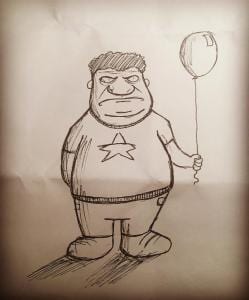I was going to do a video this morning, but then I realized I’d have to comb my hair, which is one of those things that seems way too daunting right now. So, I’ll just shove off my real work for one more moment and draw your attention to the headline over on the main page of Patheos. The piece is called “Why Are Christians So Angry and Fearful” by Vance Morgan. He is in the middle of a book by Kristin Du Mez which explains, apparently, exactly why. Reading the book prompted him to remember a piece he had written before. Here are some money quotes:
It is well-known by now that eighty percent of white voters identifying as evangelical Christians in this country voted for Donald Trump in November of 2016; the numbers of support in this demographic have not diminished. Any chances for Trump’s reelection in November 2020 depend, at least partially, on his receiving similar support from evangelicals at the polls. Robinson’s and Gerson’s stories of how this happened are somewhat different, but share one fundamental observation: a primary motivator for the world view of many American Christians is fear. Gerson writes that these Christians have turned to Donald Trump for protection as a playground weakling might use his lunch money to pay for protection from the schoolyard bully.
And:
Christianity is not scorned or rejected because it is the Gospel of faith, hope, and love but because this Christianity of theirs, on whatever pretext, is determined to bring bad news to the poor and the stranger, and is even self-righteous about this . . . Always, but certainly in situations when great things are at stake, it behooves Christians to think and act like Christians. This would mean practicing self-restraint, curbing our speech, remembering that our adversaries are owed the respect due to the divine image . . . In the great majority of cases, a sin is injury done to another person, other people, who, we must assume, God loves at least as much as he loves us. The loving-kindness Jesus models for us is very largely a matter of feeding and healing those in need of such care.
So, as you can imagine, I am very tired of the meme that the reason we have Mr. Trump is because of the bigot evangelicals. I feel like that story has been debunked any which way. Indeed, I think like four years ago I myself reviewed two books on just that issue and explained how that explanation is sorely lacking. Maybe later I’ll go dig that up and post it here another time. One could say that fear, perhaps, motivated a lot of people to vote for Mr. Trump, but not Evangelical fear. You can’t take people’s specious “Evangelical” faith—even if they self-identify as Evangelical—and read that into all their political motivations. When you ask them why they voted for Mr. Trump and they start talking about immigration, China, and the loss of jobs, and you toddle off to write your piece at the NYTimes about how racist the “Evangelicals” are, you are not hearing what they’re saying. Moreover, if you read Mr. Morgan’s whole piece, you will see great gaping holes in his expression of what Christian faith actually is, so I am inclined to view with a jaundiced eye his scolding about how Christians should behave. His view is entirely political, to the exclusion of the actual gospel of Jesus Christ which is offensive to every age, in every time, to every political system, and probably to many so-called “Evangelicals” many of whom did vote for Mr. Trump.
Anyway, that’s not entirely what interests me. Rather, it’s the tribalism of this piece—the same tribalism that was forming and shaping up way back in 2016, and the one that is corrupting the mask/covid issues, and everything else for that matter. It is nothing more than Everyone One Who Isn’t Me Is Hitler approach to discourse, the I Refuse To See Anything Good In The Arguments Of My Enemies And Will Just Keep Calling Them Fearful And Wrong. Which, wait for it, is probably one of the reasons Mr. Trump is the president.
In the spirit of breaking down the tribal barriers, I will say one good thing about the argument of Mr. Morgan. It is true that Evangelical Christians in the 80s and into the 90s spent a lot of time on politics and secularism and not enough time on the gospel. This is undisputed. It produced that old and tired Moral Therapeutic Deism. Many people lugged their Bibles around without ever cracking them open or being given a comprehensive way to understand what is written on all those pages.
That being said, however, if Evangelicals in the 80s and 90s had spent more time on the gospel, Mr. Morgan and others would probably have hated them more, though in that case for all the right reasons instead of for the wrong ones.
Anyway, it is unhelpful to call other people fearful. Fear is a human emotion that comes into the consciousness of every single person who ever lives. I’m sure that Mr. Morgan experiences fear on occassaion. Certainly I do. There is a lot at stake in the political process, even for real Christians. But I happen to know a lot of the Christians that Mr. Morgan would probably call “fearful,” who are the ones who vote the wrong way and say the wrong thing and espouse all the wrong theological opinions and guess what…they are not afraid. And they did not vote for Mr. Trump. And they know Jesus. And if Mr. Morgan spent any time with them he would be more appalled by what they believe, not less so, and he would go away afraid, because they aren’t looking for salvation from a political process.
Have a great day!













